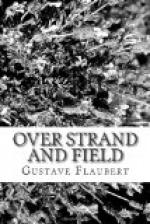Where are the inhabitants? One would think that they had all left the village to lie in wait behind the furze-bushes to catch a glimpse of the Blues who are about to pass through the ravine.
The church is poor and perfectly bare. No beautiful painted saints, no pictures on the walls or on the roof, no hanging lamp oscillating at the end of a long, straight cord. In a corner of the choir, a wick was burning in a glass filled with oil. Round wooden pillars hold up the roof, the blue paint of which has been freshened recently. The bright light of the fields, filtering through the green foliage which covers the roof of the church, shines through the white window-panes. The door, a little wooden door that closes with a latch, was open; a flight of birds came in, chirping and beating their wings against the walls; they fluttered for awhile beneath the vault and around the altar, two or three alighted upon the holy-water basin, to moisten their beaks, and then all flew away as suddenly as they had come.
It is not an unusual thing to see birds in the Breton churches; many live there and fasten their nests to the stones of the nave; they are never disturbed. When it rains, they all gather in the church, but as soon as the sun pierces the clouds and the rain-spouts dry up, they repair to the trees again. So that during the storm two frail creatures often enter the blessed house of God together; man to pray and allay his fears, and the bird to wait until the rain stops and to warm the naked bodies of its frightened young.
A peculiar charm pervades these churches. It is not their poverty that moves us, because even when they are empty, they appear to be inhabited. Is it not, then, their modesty that appeals to us? For, with their unpretentious steeples, and their low roofs hiding under the trees, they seem to shrink and humiliate themselves in the sight of God. They have not been upreared through a spirit of pride, nor through the pious fancy of some mighty man on his death-bed. On the contrary, we feel that it is the simple impression of a need, the ingenuous cry of an appetite, and, like the shepherd’s bed of dried leaves, it is the retreat the soul has built for itself where it comes to rest when it is tired. These village churches represent better than their city sisters the distinctive features of the places where they are built, and they seem to participate more directly in the life of the people who, from father to son, come to kneel at the same place and on the same stone slab. Every day, every Sunday, when they enter and when they leave, do they not see the graves of their parents, are these not near them while they pray, and does it not seem to them as if the church was only a larger family circle from which the loved ones have not altogether departed? These places of worship thus have a harmonious sense, and the life of these people is influenced by it from the baptismal font to the grave. It is not the same with us, because we have relegated eternity to the outskirts of the city, have banished our dead to the faubourgs and laid them to rest in the carpenter’s quarter, near the soda factories and night-soil magazines.




